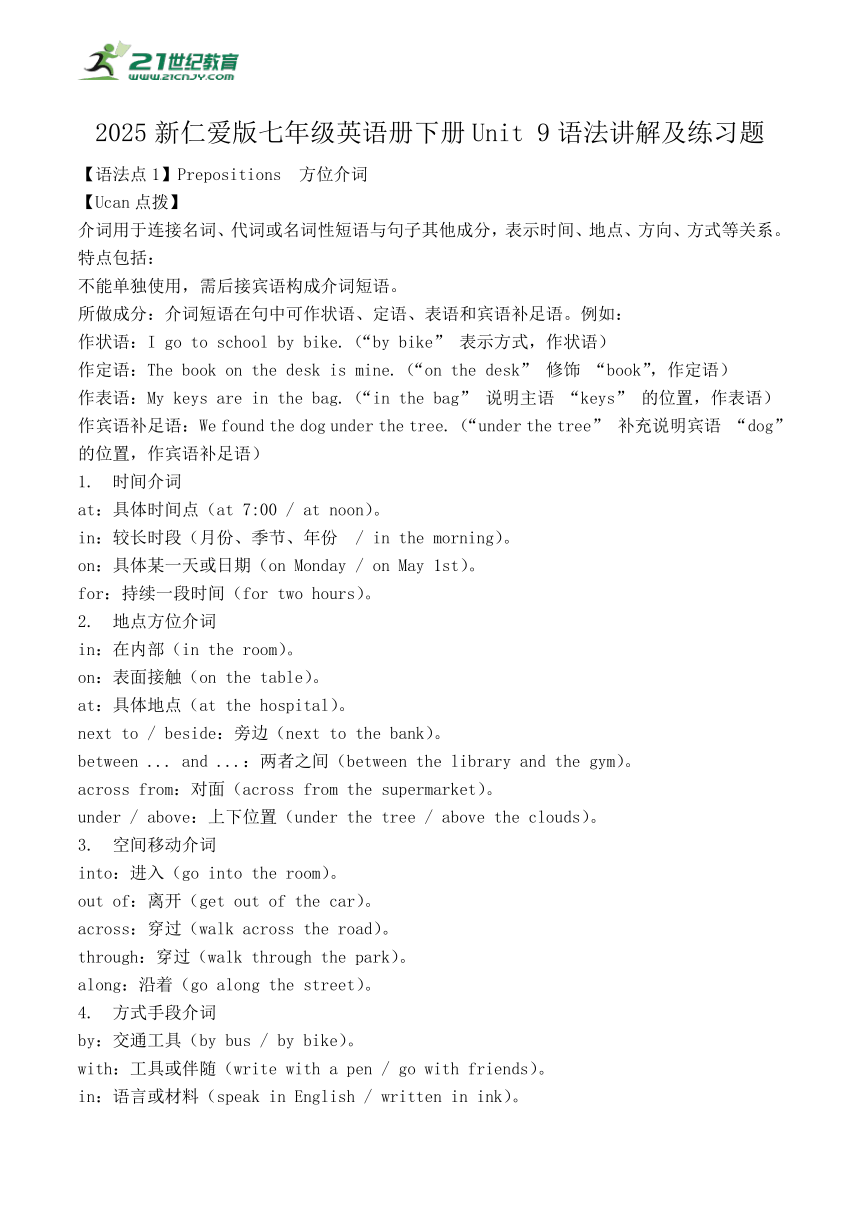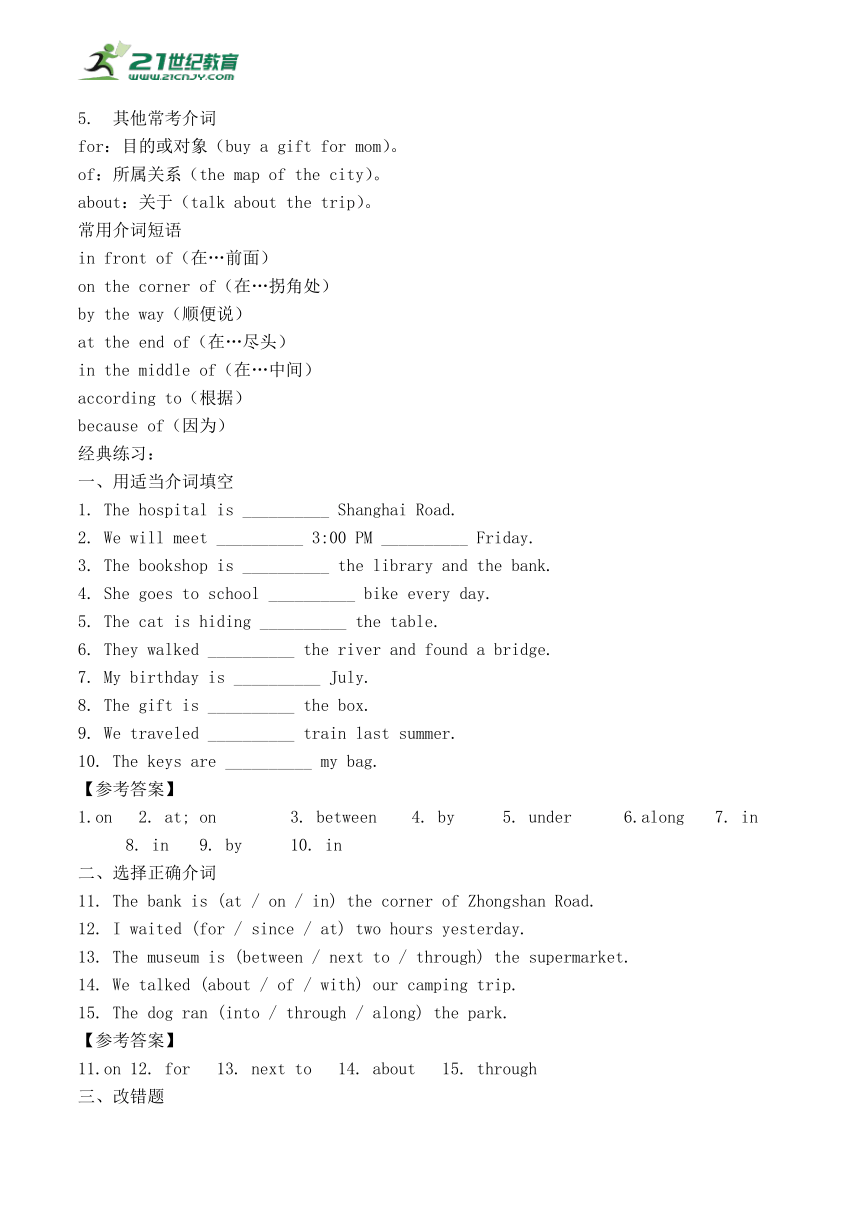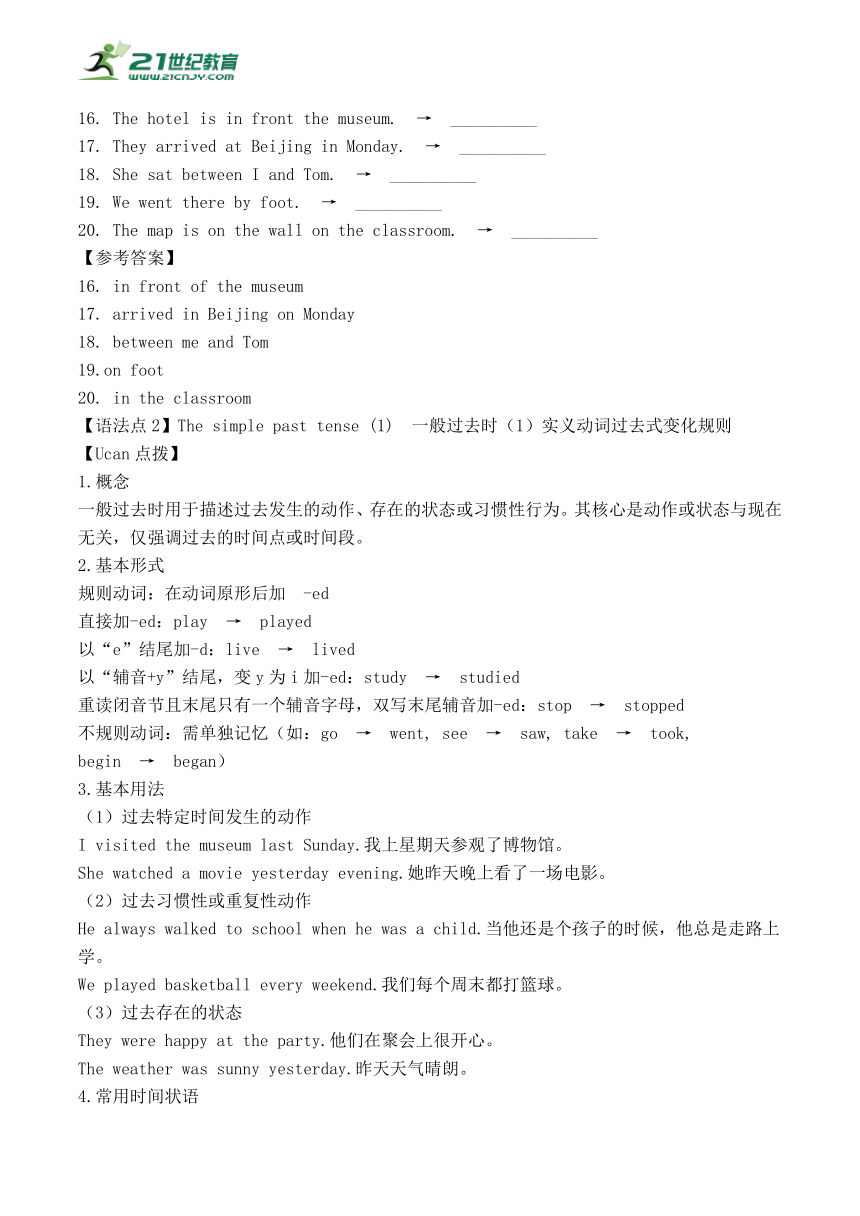Unit 9 From Here to There语法讲解+练习题(含答案)2025新仁爱版七年级英语册下册
文档属性
| 名称 | Unit 9 From Here to There语法讲解+练习题(含答案)2025新仁爱版七年级英语册下册 |

|
|
| 格式 | docx | ||
| 文件大小 | 45.3KB | ||
| 资源类型 | 试卷 | ||
| 版本资源 | 仁爱科普版 | ||
| 科目 | 英语 | ||
| 更新时间 | 2025-03-24 00:00:00 | ||
图片预览



文档简介
2025新仁爱版七年级英语册下册Unit 9语法讲解及练习题
【语法点1】Prepositions 方位介词
【Ucan点拨】
介词用于连接名词、代词或名词性短语与句子其他成分,表示时间、地点、方向、方式等关系。特点包括:
不能单独使用,需后接宾语构成介词短语。
所做成分:介词短语在句中可作状语、定语、表语和宾语补足语。例如:
作状语:I go to school by bike.(“by bike” 表示方式,作状语)
作定语:The book on the desk is mine.(“on the desk” 修饰 “book”,作定语)
作表语:My keys are in the bag.(“in the bag” 说明主语 “keys” 的位置,作表语)
作宾语补足语:We found the dog under the tree.(“under the tree” 补充说明宾语 “dog” 的位置,作宾语补足语)
1. 时间介词
at:具体时间点(at 7:00 / at noon)。
in:较长时段(月份、季节、年份 / in the morning)。
on:具体某一天或日期(on Monday / on May 1st)。
for:持续一段时间(for two hours)。
2. 地点方位介词
in:在内部(in the room)。
on:表面接触(on the table)。
at:具体地点(at the hospital)。
next to / beside:旁边(next to the bank)。
between ... and ...:两者之间(between the library and the gym)。
across from:对面(across from the supermarket)。
under / above:上下位置(under the tree / above the clouds)。
3. 空间移动介词
into:进入(go into the room)。
out of:离开(get out of the car)。
across:穿过(walk across the road)。
through:穿过(walk through the park)。
along:沿着(go along the street)。
4. 方式手段介词
by:交通工具(by bus / by bike)。
with:工具或伴随(write with a pen / go with friends)。
in:语言或材料(speak in English / written in ink)。
5. 其他常考介词
for:目的或对象(buy a gift for mom)。
of:所属关系(the map of the city)。
about:关于(talk about the trip)。
常用介词短语
in front of(在…前面)
on the corner of(在…拐角处)
by the way(顺便说)
at the end of(在…尽头)
in the middle of(在…中间)
according to(根据)
because of(因为)
经典练习:
一、用适当介词填空
1. The hospital is __________ Shanghai Road.
2. We will meet __________ 3:00 PM __________ Friday.
3. The bookshop is __________ the library and the bank.
4. She goes to school __________ bike every day.
5. The cat is hiding __________ the table.
6. They walked __________ the river and found a bridge.
7. My birthday is __________ July.
8. The gift is __________ the box.
9. We traveled __________ train last summer.
10. The keys are __________ my bag.
【参考答案】
1.on 2. at; on 3. between 4. by 5. under 6.along 7. in 8. in 9. by 10. in
二、选择正确介词
11. The bank is (at / on / in) the corner of Zhongshan Road.
12. I waited (for / since / at) two hours yesterday.
13. The museum is (between / next to / through) the supermarket.
14. We talked (about / of / with) our camping trip.
15. The dog ran (into / through / along) the park.
【参考答案】
11.on 12. for 13. next to 14. about 15. through
三、改错题
16. The hotel is in front the museum. → __________
17. They arrived at Beijing in Monday. → __________
18. She sat between I and Tom. → __________
19. We went there by foot. → __________
20. The map is on the wall on the classroom. → __________
【参考答案】
16. in front of the museum
17. arrived in Beijing on Monday
18. between me and Tom
19.on foot
20. in the classroom
【语法点2】The simple past tense (1) 一般过去时(1)实义动词过去式变化规则
【Ucan点拨】
1.概念
一般过去时用于描述过去发生的动作、存在的状态或习惯性行为。其核心是动作或状态与现在无关,仅强调过去的时间点或时间段。
2.基本形式
规则动词:在动词原形后加 -ed
直接加-ed:play → played
以“e”结尾加-d:live → lived
以“辅音+y”结尾,变y为i加-ed:study → studied
重读闭音节且末尾只有一个辅音字母,双写末尾辅音加-ed:stop → stopped
不规则动词:需单独记忆(如:go → went, see → saw, take → took, begin → began)
3.基本用法
(1)过去特定时间发生的动作
I visited the museum last Sunday.我上星期天参观了博物馆。
She watched a movie yesterday evening.她昨天晚上看了一场电影。
(2)过去习惯性或重复性动作
He always walked to school when he was a child.当他还是个孩子的时候,他总是走路上学。
We played basketball every weekend.我们每个周末都打篮球。
(3)过去存在的状态
They were happy at the party.他们在聚会上很开心。
The weather was sunny yesterday.昨天天气晴朗。
4.常用时间状语
yesterday(昨天)
last week/month/year(上周/上个月/去年)
two days ago(两天前)
in 2020(在2020年)
then(那时)
when I was young(当我年轻时)
5.句式结构
肯定句:主语 + 动词过去式 + 其他。
We climbed mountains last Sunday.(我们上周日爬山了。)
否定句:
be 动词的否定:主语 + was/were + not + 其他。
例如:I was not at school yesterday.(我昨天不在学校。)
实义动词的否定:主语 + didn't + 动词原形 + 其他。
例如:She didn't go to the park last weekend.(她上周末没去公园。)
经典练习:
1. I ___________ (go) to the park yesterday.
2. She ___________ (read) a book last night.
3. They ___________ (play) football last weekend.
4. We ___________ (watch) a movie last Saturday.
5. He ___________ (eat) breakfast this morning.
6. She ___________ (not go) to school yesterday.
7. They ___________ (not play) basketball last night.
8. We ___________ (not watch) TV last night.
9. He ___________ (not eat) lunch yesterday.
10. I ___________ (visit) my friends last Sunday.
11. She ___________ (write) a letter last night.
12. They ___________ (sing) a song last weekend.
13. We ___________ (dance) at the party last night.
14. He ___________ (swim) in the pool last afternoon.
15. She ___________ (not visit) her grandparents last weekend.
16. They ___________ (not write) a letter last night.
17. We ___________ (not sing) a song last weekend.
18. He ___________ (not dance) at the party last night.
19. I ___________ (not swim) in the pool last afternoon.
20. She ___________ (run) in the park last morning.
【参考答案】
1. 答案:went
解析:“yesterday”是一般过去时的时间标志词,“go”是不规则动词,其过去式为“went”。
2. 答案:read
解析:“last night”表明该句时态为一般过去时,“read”的过去式形式和原形相同,但读音不同,过去式读作 /red/。
3. 答案:played
解析:“last weekend”提示句子用一般过去时,“play”是规则动词,其过去式是在词尾直接加 -ed。
4. 答案:watched
解析:“last Saturday”表示过去时间,“watch”为规则动词,过去式是在词尾加 -ed。
5. 答案:ate
解析:“this morning”指过去的时间,“eat”是不规则动词,过去式是“ate”。
6. 答案:didn't go
解析:“yesterday”说明是一般过去时,实义动词的否定句需借助助动词“didn't”,动词还原为原形“go”。
7. 答案:didn't play
解析:“last night”决定句子用一般过去时,实义动词“play”的否定借助“didn't”,动词用原形。
8. 答案:didn't watch
解析:“last night”表明时态为一般过去时,实义动词“watch”的否定是“didn't + 动词原形”。
9. 答案:didn't eat
解析:“yesterday”提示用一般过去时,实义动词“eat”的否定借助“didn't”,动词用原形。
10. 答案:visited
解析:“last Sunday”是过去时间,“visit”是规则动词,过去式在词尾加 -ed。
11. 答案:wrote
解析:“last night”表示过去,“write”是不规则动词,过去式是“wrote”。
12. 答案:sang
解析:“last weekend”表明句子时态为一般过去时,“sing”是不规则动词,其过去式是“sang”。
13. 答案:danced
解析:“last night”说明用一般过去时,“dance”是以不发音的 e 结尾的规则动词,过去式直接加 -d。
14. 答案:swam
解析:“last afternoon”是过去时间,“swim”是不规则动词,过去式是“swam”。
15. 答案:didn't visit
解析:“last weekend”提示用一般过去时,实义动词“visit”的否定借助“didn't”,动词用原形。
16. 答案:didn't write
解析:“last night”决定句子时态为一般过去时,实义动词“write”的否定借助“didn't”,动词用原形。
17. 答案:didn't sing
解析:“last weekend”表明是一般过去时,实义动词“sing”的否定借助“didn't”,动词用原形。
18. 答案:didn't dance
解析:“last night”说明用一般过去时,实义动词“dance”的否定借助“didn't”,动词用原形。
19. 答案:didn't swim
解析:“last afternoon”是过去时间,实义动词“swim”的否定借助“didn't”,动词用原形。
20. 答案:ran
解析:“last morning”表示过去,“run”是不规则动词,过去式是“ran”。
【语法点1】Prepositions 方位介词
【Ucan点拨】
介词用于连接名词、代词或名词性短语与句子其他成分,表示时间、地点、方向、方式等关系。特点包括:
不能单独使用,需后接宾语构成介词短语。
所做成分:介词短语在句中可作状语、定语、表语和宾语补足语。例如:
作状语:I go to school by bike.(“by bike” 表示方式,作状语)
作定语:The book on the desk is mine.(“on the desk” 修饰 “book”,作定语)
作表语:My keys are in the bag.(“in the bag” 说明主语 “keys” 的位置,作表语)
作宾语补足语:We found the dog under the tree.(“under the tree” 补充说明宾语 “dog” 的位置,作宾语补足语)
1. 时间介词
at:具体时间点(at 7:00 / at noon)。
in:较长时段(月份、季节、年份 / in the morning)。
on:具体某一天或日期(on Monday / on May 1st)。
for:持续一段时间(for two hours)。
2. 地点方位介词
in:在内部(in the room)。
on:表面接触(on the table)。
at:具体地点(at the hospital)。
next to / beside:旁边(next to the bank)。
between ... and ...:两者之间(between the library and the gym)。
across from:对面(across from the supermarket)。
under / above:上下位置(under the tree / above the clouds)。
3. 空间移动介词
into:进入(go into the room)。
out of:离开(get out of the car)。
across:穿过(walk across the road)。
through:穿过(walk through the park)。
along:沿着(go along the street)。
4. 方式手段介词
by:交通工具(by bus / by bike)。
with:工具或伴随(write with a pen / go with friends)。
in:语言或材料(speak in English / written in ink)。
5. 其他常考介词
for:目的或对象(buy a gift for mom)。
of:所属关系(the map of the city)。
about:关于(talk about the trip)。
常用介词短语
in front of(在…前面)
on the corner of(在…拐角处)
by the way(顺便说)
at the end of(在…尽头)
in the middle of(在…中间)
according to(根据)
because of(因为)
经典练习:
一、用适当介词填空
1. The hospital is __________ Shanghai Road.
2. We will meet __________ 3:00 PM __________ Friday.
3. The bookshop is __________ the library and the bank.
4. She goes to school __________ bike every day.
5. The cat is hiding __________ the table.
6. They walked __________ the river and found a bridge.
7. My birthday is __________ July.
8. The gift is __________ the box.
9. We traveled __________ train last summer.
10. The keys are __________ my bag.
【参考答案】
1.on 2. at; on 3. between 4. by 5. under 6.along 7. in 8. in 9. by 10. in
二、选择正确介词
11. The bank is (at / on / in) the corner of Zhongshan Road.
12. I waited (for / since / at) two hours yesterday.
13. The museum is (between / next to / through) the supermarket.
14. We talked (about / of / with) our camping trip.
15. The dog ran (into / through / along) the park.
【参考答案】
11.on 12. for 13. next to 14. about 15. through
三、改错题
16. The hotel is in front the museum. → __________
17. They arrived at Beijing in Monday. → __________
18. She sat between I and Tom. → __________
19. We went there by foot. → __________
20. The map is on the wall on the classroom. → __________
【参考答案】
16. in front of the museum
17. arrived in Beijing on Monday
18. between me and Tom
19.on foot
20. in the classroom
【语法点2】The simple past tense (1) 一般过去时(1)实义动词过去式变化规则
【Ucan点拨】
1.概念
一般过去时用于描述过去发生的动作、存在的状态或习惯性行为。其核心是动作或状态与现在无关,仅强调过去的时间点或时间段。
2.基本形式
规则动词:在动词原形后加 -ed
直接加-ed:play → played
以“e”结尾加-d:live → lived
以“辅音+y”结尾,变y为i加-ed:study → studied
重读闭音节且末尾只有一个辅音字母,双写末尾辅音加-ed:stop → stopped
不规则动词:需单独记忆(如:go → went, see → saw, take → took, begin → began)
3.基本用法
(1)过去特定时间发生的动作
I visited the museum last Sunday.我上星期天参观了博物馆。
She watched a movie yesterday evening.她昨天晚上看了一场电影。
(2)过去习惯性或重复性动作
He always walked to school when he was a child.当他还是个孩子的时候,他总是走路上学。
We played basketball every weekend.我们每个周末都打篮球。
(3)过去存在的状态
They were happy at the party.他们在聚会上很开心。
The weather was sunny yesterday.昨天天气晴朗。
4.常用时间状语
yesterday(昨天)
last week/month/year(上周/上个月/去年)
two days ago(两天前)
in 2020(在2020年)
then(那时)
when I was young(当我年轻时)
5.句式结构
肯定句:主语 + 动词过去式 + 其他。
We climbed mountains last Sunday.(我们上周日爬山了。)
否定句:
be 动词的否定:主语 + was/were + not + 其他。
例如:I was not at school yesterday.(我昨天不在学校。)
实义动词的否定:主语 + didn't + 动词原形 + 其他。
例如:She didn't go to the park last weekend.(她上周末没去公园。)
经典练习:
1. I ___________ (go) to the park yesterday.
2. She ___________ (read) a book last night.
3. They ___________ (play) football last weekend.
4. We ___________ (watch) a movie last Saturday.
5. He ___________ (eat) breakfast this morning.
6. She ___________ (not go) to school yesterday.
7. They ___________ (not play) basketball last night.
8. We ___________ (not watch) TV last night.
9. He ___________ (not eat) lunch yesterday.
10. I ___________ (visit) my friends last Sunday.
11. She ___________ (write) a letter last night.
12. They ___________ (sing) a song last weekend.
13. We ___________ (dance) at the party last night.
14. He ___________ (swim) in the pool last afternoon.
15. She ___________ (not visit) her grandparents last weekend.
16. They ___________ (not write) a letter last night.
17. We ___________ (not sing) a song last weekend.
18. He ___________ (not dance) at the party last night.
19. I ___________ (not swim) in the pool last afternoon.
20. She ___________ (run) in the park last morning.
【参考答案】
1. 答案:went
解析:“yesterday”是一般过去时的时间标志词,“go”是不规则动词,其过去式为“went”。
2. 答案:read
解析:“last night”表明该句时态为一般过去时,“read”的过去式形式和原形相同,但读音不同,过去式读作 /red/。
3. 答案:played
解析:“last weekend”提示句子用一般过去时,“play”是规则动词,其过去式是在词尾直接加 -ed。
4. 答案:watched
解析:“last Saturday”表示过去时间,“watch”为规则动词,过去式是在词尾加 -ed。
5. 答案:ate
解析:“this morning”指过去的时间,“eat”是不规则动词,过去式是“ate”。
6. 答案:didn't go
解析:“yesterday”说明是一般过去时,实义动词的否定句需借助助动词“didn't”,动词还原为原形“go”。
7. 答案:didn't play
解析:“last night”决定句子用一般过去时,实义动词“play”的否定借助“didn't”,动词用原形。
8. 答案:didn't watch
解析:“last night”表明时态为一般过去时,实义动词“watch”的否定是“didn't + 动词原形”。
9. 答案:didn't eat
解析:“yesterday”提示用一般过去时,实义动词“eat”的否定借助“didn't”,动词用原形。
10. 答案:visited
解析:“last Sunday”是过去时间,“visit”是规则动词,过去式在词尾加 -ed。
11. 答案:wrote
解析:“last night”表示过去,“write”是不规则动词,过去式是“wrote”。
12. 答案:sang
解析:“last weekend”表明句子时态为一般过去时,“sing”是不规则动词,其过去式是“sang”。
13. 答案:danced
解析:“last night”说明用一般过去时,“dance”是以不发音的 e 结尾的规则动词,过去式直接加 -d。
14. 答案:swam
解析:“last afternoon”是过去时间,“swim”是不规则动词,过去式是“swam”。
15. 答案:didn't visit
解析:“last weekend”提示用一般过去时,实义动词“visit”的否定借助“didn't”,动词用原形。
16. 答案:didn't write
解析:“last night”决定句子时态为一般过去时,实义动词“write”的否定借助“didn't”,动词用原形。
17. 答案:didn't sing
解析:“last weekend”表明是一般过去时,实义动词“sing”的否定借助“didn't”,动词用原形。
18. 答案:didn't dance
解析:“last night”说明用一般过去时,实义动词“dance”的否定借助“didn't”,动词用原形。
19. 答案:didn't swim
解析:“last afternoon”是过去时间,实义动词“swim”的否定借助“didn't”,动词用原形。
20. 答案:ran
解析:“last morning”表示过去,“run”是不规则动词,过去式是“ran”。
同课章节目录
